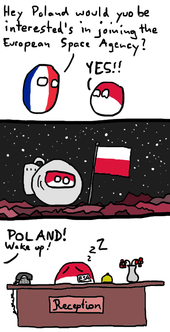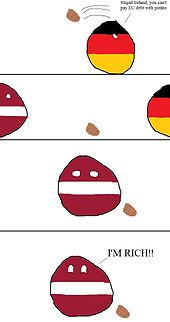Polandball
Polandball is a user-generated internet phenomenon that has its origin in the / INT / board of the German-language picture forum krautchan.net and appeared there for the first time in the second half of 2009. Polandball manifests itself through online comics in which nations usually communicate with one another as circular figures in often broken English. In a satirical way, the comics make use of national clichés , international relations and political and historical events. The comics are called Polandball (even if Poland does not appear as a cartoon character) or Countryballs (in German "Länderkugeln").
history
Polandball originated from a cyber war in August 2009 between Polish internet users and users from the rest of the world on drawball.com. The website, which offers a kind of virtual canvas, allows users to draw whatever they like and also to paint over other people's pictures. The idea of drawing the Polish flag on the ball came up on the Polish Internet , and with the help of thousands of Poles, it was possible to copy the drawing ball with white paint over red and the word “ Polska ” written in the middle, the Poké ball was modeled after. The English-language image board 4chan then coordinated and took over the ball again with the drawing of a large swastika .
Krautchan.net was a German-language picture forum whose / INT / -board was frequented by English-speaking netizens . The beginning of the Polandball is attributed to the user Falco , a Briton on / INT / who created the meme with MS Paint in September 2009 . He wanted to troll against Wojak , a Pole on the same board who wrote in broken English. After that, Russians enthusiastically began drawing Polandball cartoons.
Polandball comics don't have specific authors, and anyone can create one. This led to this meme that spanned numerous sites including Reddit .
subjects
Poland

Polandball gained popularity in the wake of the plane crash of Polish President Lech Kaczyński . Poland's history in relations with other countries and its stereotypes form the basis, often related to Polish megalomania and national complexes . Interactions between Polandballs tend to be written in broken English and internet slang , similar to the Lolcat meme. At the end of the cartoon there is typically a weeping Polandball with a red top and white bottom (the inverted Polish flag).
Some Polandball comics arise from the fact that Poland does not have its own space program (like Russia, for example ). One of the most famous Polandball cartoons starts with the assumption that the earth will be hit by a large meteor , which causes all countries with space technology to leave the earth and take an orbit around the planet. At the end you see Polandball still on earth, crying and shouting the slogan “Poland cannot into space”. In this humorous way, Russian users created a breakpoint in the discussion with Poland about which country is the predominant one. In another comic you can see Polandball boring other countries by proclaiming: "When we defeated Russia and the Turks (sic), we were the largest country in the world ... and ...". That makes the other countryballs laugh at him. The now irritated Polandball shouts “ kurwa ” and holds up a sign that reads “Internet serious business”. This is an internet buzzword used to deride people who treat discussion topics with contempt. According to the usual Polandball convention, the cartoon ends with a weeping Polandball.
Other country balls

Polandball can contain comics about other countries, but by convention these comics are still commonly called Polandball, although they can also be called countryballs. Other countries are also represented as spheres, although Singapore takes the shape of a triangle and is called Tringapore; Israel has the shape of a hypercube ( tesseract ) (based on so-called Jewish physics ); Kazakhstan is in the shape of a brick (Kazakhbrick) and Great Britain has a cylinder and monocle in pictures ( Hong Kong too, since it was once a colony of the British Empire ). Furthermore, the USA is shown with sunglasses, Canada with a raccoon hat and Japan as kawaii . In the course of the euro crisis and Germany's strong presence within the European Union, a figure of its own, the "Reichtangle", was dedicated to it. Reichtangle has the shape of a rectangle and the name is based on the word "Reich", which is spoken like "Reik" in English, and the English word for rectangle "Rectangle". The Reichtangle is the resurrected German Empire, which as a rule finds it difficult to orientate itself at the present time. It is not to be confused with the historical German Empire, which is still drawn as a sphere. Due to the deliberately wrong color choice of the Poland ball (i.e. red horizontal stripes above, white horizontal stripes below), it is confused with the specimens from Indonesia and Monaco , whose national flags actually look like this. Within the comics, this is usually solved by the Indonesian ball wearing a rice hat or songkok , and the Monaco ball speaking French.
The simplicity of Polandball, complemented by the focus on current affairs in the world, make the meme suitable for commenting on international events. Among the topics covered by Polandball that appeared in the media are the dispute over the Senkaku Islands , the 2013 conclave in which Jorge Mario Bergoglio became the new Pope , the war in Ukraine since 2014 , the Crimean crisis in 2014 or the problems of Filipino workers in Taiwan.
rating

A report by Vesti FM noted a post on LiveJournal that asked readers what five images readers think of when they think of Poland and the Poles. The five pages of answers that illustrate the deep links between Poland and Russia named topics such as Pseudodimitri I , Tomek in the Land of Kangaroos by the Polish author Alfred Szklarski , four tank soldiers and a dog , Russophobia and Polandball.
Wojciech Oleksiak wrote about Polandball on culture.pl, a project of the Adam Mickiewicz Institute . The ability for anyone to create a Polandball comic, he said, creates new opportunities for people to express their personal views on race, religion and history. He described polandball as the embodiment par excellence of the Internet itself and mentioned also that comics "rough, rude, racist, offensive or just totally stupid" may be, as he also points out, that the political incorrectness of contributing to the attractiveness of the Memes.
At the same time, Oleksiak notes that Polandball comics often use exaggerated Polish stereotypes, e.g. For example, that Poles do not speak English as competently as other nationalities and that Poland itself is a country full of dull psycho-Catholics. On the other hand, some stereotypes used in Polandball comics are more appropriate, such as that Poles like to tell stories about their glamorous past or that a tendency to martyrdom is deeply anchored in Poland's self-confidence. On the other hand, the stereotype that Poland has certain "national complexes" and often blames external forces for mistakes in its history is somewhat justifiable, since Russia and Germany are not always the friendliest neighbors.
Oleksiak also writes that Polandball could help Poles learn a “sense of humor about our longstanding grudges”.
Individual evidence
- ↑ a b c d e f Wojciech Orliński : Wyniosłe lol zaborców, czyli Polandball (Polish) , Gazeta Wyborcza . January 16, 2010. Archived from the original on January 17, 2010. Retrieved May 13, 2013.
- ↑ a b c d Radosław Zapałowski: Znowu lecą z nami w ... kulki (Polish) . In: Interia , Cooltura , February 15, 2010. Archived from the original on May 14, 2013. Retrieved March 22, 2012.
- ↑ a b c d Kuba Kapiszewski: Fenomem - Polska nie umieć kosmos (Polish) , Przegląd . 13/2010. Archived from the original on August 5, 2014. Retrieved August 5, 2014.
- ↑ Polandball . Know your meme . Retrieved August 6, 2014.
- ^ A b c Nils Dagsson Moskopp Erlehmann, Christian Heller Plomlompom: Internet memes. Short & geek. 1st edition. O'Reilly Verlag, 2013, ISBN 978-3-86899-806-1 , pp. 86-88, ( books.google.com.au MS-Paint-Comics).
- ↑ a b c d Is there a series of irreverent political cartoons summing up the crisis? , Vox Media . July 25, 2014. Archived from the original on August 6, 2014. Retrieved on August 6, 2014.
- ↑ a b Polandball is Reddit's answer to Crimea crisis . In: The Sunday Business Post , March 4, 2014. Retrieved November 8, 2014.
- ↑ a b Tomek Cegielski: MEMY. Legendy Internetu (Polish) , Hiro.pl. April 12, 2011. Archived from the original on April 15, 2011. Retrieved on August 5, 2014.
- ↑ Polski internet to potęga, po co te kompleksy? (Polish) , Spider's Web. May 11, 2012. Archived from the original on August 5, 2014. Retrieved on August 5, 2014.
- ↑ a b Камышин "может в кантриболз" (Russian) . In: Infokam , August 7, 2014. Archived from the original on November 8, 2014. Retrieved on November 8, 2014.
- ↑ Polandball cartoon . Unknown. Unknown. Archived from the original on August 5, 2014. Retrieved August 5, 2014.
- ↑ Japon, Chine, vers une nouvelle guerre froide (French) . In: France Culture , March 9, 2013. Archived from the original on November 8, 2014. Retrieved on November 8, 2014.
- ↑ Wybór Franciszka okiem internautów (Polish) , Onet.pl . March 14, 2013. Archived from the original on August 6, 2014. Retrieved on August 6, 2014.
- ↑ Аниматор из Камышина нарисовал мультфильм о "заболевшей" Украине (Russian) . In: Argumenty i Fakty , August 6, 2014. Archived from the original on November 8, 2014. Retrieved on November 8, 2014.
- ↑ 台灣 最 美麗 的 風景 是 人 真的 嗎? (Taiwan is one of the most beautiful landscapes, really?) (Chinese) , Apple Daily (Taiwanese edition) . July 31, 2014. Archived from the original on August 6, 2014. Retrieved on August 6, 2014.
- ↑ a b c d Polandball - A Case Study . In: Culture.pl , Adam Mickiewicz Institute , June 9, 2014. Archived from the original on August 6, 2014. Retrieved on August 6, 2014.
- ↑ Польша у россиян ассоциируется с Лжедмитрием и Польшаром (Russian) . In: Vesti FM , August 25, 2013. Archived from the original on November 8, 2014. Retrieved on November 8, 2014.
Web links
- Polandball on Reddit
- Polandball at Knowyourmeme.com
- Polandball at militaryphotos.net

